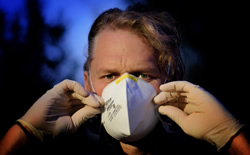Natasha Hinde* says concern about coronavirus is real, but there are ways to stop this spilling over into fear and unhealthy anxiety.
 For some, anxiety and fear around COVID-19 are taking hold — and is it any wonder, considering it’s dominating the news?
For some, anxiety and fear around COVID-19 are taking hold — and is it any wonder, considering it’s dominating the news?
Worry is a rational reaction to something we can’t control, but when these fears start to rule our lives, we need to do something about it, says therapist Pam Custers.
Otherwise, it can start “sabotaging our thought processes”.
When we’re tipped over into a state of anxiety, we might feel panicky and worry more than normal.
Some people might have difficulty concentrating; others will change their daily routines to avoid whatever it is they fear.
Custers gives the example of getting into a lift and suddenly feeling like you have to leave or struggling to get on public transport to work because of a fear of catching something.
So, what can you do about it?
Challenge your thoughts
The key to reducing fear, or at least controlling it, is to challenge your way of thinking.
“It’s a balance between challenging thought processes and having healthy caution,” says Custers.
It’s normal to worry.
“When we see or hear of someone that’s been ill, or see a news story, of course our mind is going to go to that place,” therapist Natasha Crowe says.
“Some of it is rational, but [the issue] is when we catastrophise and it becomes a worst-case scenario that we can’t get out of.”
If you fear that you have, or might get, coronavirus, ask yourself: Do I have evidence?
Am I at risk?
Have I been in contact with someone who has had it?
Am I feeling ill?
“The likelihood is that for most people, they’re at very low risk,” says Crowe.
Step back from the news
We should keep ourselves informed about how to manage ourselves healthwise, but we don’t need to be glued to every single news report, says Custers.
If you find it’s all getting too much, avoid the news and social media.
“Staying overly connected to news coverage can negatively impact mental health, so it is important to monitor their intake if they notice a rise in anxiety,” therapist Nicole Bentley says.
“Keep in perspective how many times you are hearing about the virus and how much energy you are devoting to thinking about it every day,” says clinician Esther Saggurthi.
“This is not something to obsess over, but rather to be conscious and aware of.”
Have some perspective
The stats around confirmed cases can sound scary on their own — and we shouldn’t underestimate what could happen with this virus — but when you compare these to the number of people who develop and die from flu each year, your perspective may change.
The World Health Organisation (WHO) estimates that every year, flu results in 3–5 million cases of severe illness globally, and about 250,000 to 500,000 deaths.
Practise self-care
For people with anxiety — particularly health anxiety — reading updates about coronavirus and poring over advice may not help.
Counsellor Sally Brown often tells her clients to have a “daily prescription” of self-care to build resilience.
This could be spending 30 minutes outdoors, speaking to a friend who makes you laugh, or just carving out time in your day to truly relax.
Be aware of your avoidance strategies
If you’re feeling anxious about coronavirus, you might be tempted to stop taking public transport or stay in the house.
While giving in to those avoidance techniques can help in the short-term, Brown says it makes your anxiety worse in the long-term.
If your anxiety starts to impact your day-to-day behaviour, Custers recommends seeing a therapist.
“Speak to someone if you’re overwhelmed.”
“You might need a couple of sessions.”
Focus on what you can control
Brown will often ask clients to draw two circles — the circle of influence and circle of concern.
In the circle of concern, she asks patients to write everything they’re worried about.
In the circle of influence, she asks them to write what they can actually control.
“The circle of influence is where you direct your energy,” she says.
“When it comes to something like this [coronavirus], it’s about controlling your hygiene and immune system.”
The best way to protect against illness is to practise good hygiene.
This means regularly washing hands with warm water and soap, particularly after using public transport or before eating.
If you need to sneeze or cough, do so into a tissue and then immediately bin the tissue afterwards — remember “catch it, bin it, kill it”.
If you don’t have a tissue, cough or sneeze into the crook of your elbow — especially if travelling on public transport where you need to touch handles.
“It is easy to feel like one’s life is out of control and focus on the futility of life in these situations,” Saggurthi said.
“The increased anxiety over a situation which is mostly beyond our control may cause us to rationalise and make poor decisions and may result in returning to behaviours we were working hard to quit in the first place.”
Break your day into chunks
Feeling completely overwhelmed?
It’s time to take a step back.
Rather than thinking about the whole day ahead of you, break it down into chunks, says Crowe.
First things first, focus on getting yourself to work.
Then on sitting down at your desk and doing work.
Next, eating your lunch.
The idea is that you’re not letting your feelings and thoughts run away with you.
It’s all about the small steps we can take on a daily basis.
If you or someone you know needs help, call: Lifeline on 13 11 14; Beyond Blue on 1300 22 46 36; Headspace on 1800 650 890.
* Natasha Hinde is a lifestyle writer at The Huffington Post UK. She tweets at @tashahinde.
This article first appeared at www.huffingtonpost.com.au.











